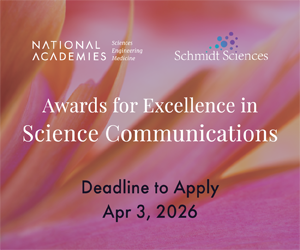A day-long game at ScienceWriters 2009 allowed NASW members to tackle head-on the question weighing heaviest on the minds of science writers everywhere: What is the future of our field? As a reflection of just how dire a media landscape fraught with so much unprecedented change has become, the game kicked off with the prediction of an exuberant deus ex machina.
By Amanda Martinez
A day-long game at ScienceWriters 2009 allowed NASW members to tackle head-on the question weighing heaviest on the minds of science writers everywhere: What is the future of our field? As a reflection of just how dire a media landscape fraught with so much unprecedented change has become, the game kicked off with the prediction of an exuberant deus ex machina.
"GOD REAPPEARS," the card read. "Offers moral order to science writers to make sense of overflowing data." It was hastily followed by another card: "Devil reappears — offers moral corruption to science writers to ignore data and just make up good stories that sell." The matter was settled by a third card describing the arrival of renowned atheist Richard Dawkins, who quickly restored to science writers their destiny.
The game was straightforward with one broad rule — any idea goes — and NASW members quickly got into the spirit. To augur something optimistic, you filled out a "positive imagination" card. Negative predictions were consigned to "dark imagination" cards. And neutral response cards allowed players to disagree with or build upon ideas. All cards were posted on brown paper, which allowed players to draw lines linking their ideas. By day's end, the paper — which covered a wall about 4 feet high and 20 feet wide — revealed a sprawling web of forecasts.
"I wanted to offer a venue for people to engage, to get their ideas out there," says David Harris, the game's mastermind and editor-in-chief of Symmetry magazine. "I firmly believe that there's a healthy, exciting future ahead of us, but we need to put our brains to work in a really creative way."
Creativity was in ample supply, although it manifested in multiple forms. Some idea threads were posted in earnest. A debate about life sans embargoes explored a scenario that effectively "killed the hegemony" of peer-reviewed journals and allowed writers to focus on "accuracy over expediency." Another post turned the current avalanche of raw data into an asset, casting future science writers as "the ultimate fact checkers" and masters of statistics.
But other threads enlisted the game as an outlet through which NASW members could vent their fears, frustration and exhaustion. These threads ranged from the hyperbolically hopeful (consumers suddenly insist on "analytical, thoughtful stories" that are "best, not first" and brains are rewired to be "sexually stimulated by solid science reporting") to the downright macabre (web terrorists erase all online journalism, the average attention span plummets to 1.2 seconds, and video footage-hungry journalists seek only the most charismatic scientists.) A prediction that Google would hire reporters to "auto-tune" content for readers, virtually eradicating traffic to all other news sites, struck onlookers as particularly disturbing — perhaps because it seems so possible.
According to Harris, this built-in catharsis valve was all part of the plan. The mix of seriousness and fun, he said, was crucial to establish a safe space in which bold, new ideas could flourish. And in fact, the game did yield at least two novel roles that future science writers might fill: a "coder-editor" whose job would be to evolve publications in lockstep with advancing technology and a "visualizer," who, in a future where scientific research was transparent, would aid reporters in analyzing raw data.
Ultimately, Harris hopes this weekend's game will serve as a launching point for an online version to be continued among NASW members over the coming months. "We're at such a critical time with our future going potentially so many different ways," Harris says. "it's important that we continue to find ways to help shape it both for us and for society."
Amanda Martinez was a Graduate Student Travel Fellow at ScienceWriters 2009. She is a master's student in the MIT Graduate Program in Science Writing.


